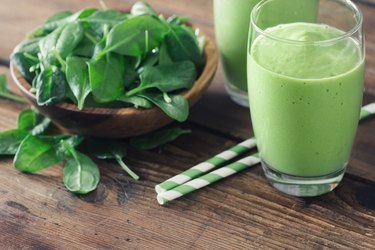
Popeye's love of canned spinach may have increased his strength, but it did nothing to please his taste buds. Combining spinach with fruit into a smoothie drink not only provides all the benefits and nutrition of raw spinach, but, because it tastes great, you will be more likely to drink this healthy beverage more often.
Tip
Adding spinach to your smoothie significantly increases the nutritional quality of your smoothie, upping your fiber, antioxidant, and phytochemical intake.
Video of the Day
The Taste
Spinach smoothies provide a significant amount of vegetable-based nutrition in a pleasant-tasting drink. Many people find it difficult to eat enough vegetables for proper nutrition because of their bitter taste, a problem they may not outgrow. The ability to taste bitter foods lies in genetic differences that originally conveyed the selective advantage of helping early humans avoid poisonous plants. Today, these same genes cause many individuals to avoid eating nutritious foods, such as spinach, because they taste bitter. Masking the bitter taste of spinach by adding more pleasant and sweet-tasting fruits such as mangos, oranges, blueberries and apples into a smoothie can override your natural aversion, allowing you to receive the nutritional benefits of otherwise unpleasant-tasting vegetables.
Video of the Day
Cancer Prevention
Adding spinach to smoothies increases your intake of carotenoid compounds. Carotenoids from green leafy vegetables may decrease the risk of prostate cancer, according to a 2001 article in the "Journal of Nutrition." Cartenoids not only induce prostate cancer cells to self-destruct, they also prevent their replication. Spinach may also reduce the risk of ovarian, bladder, liver and lung cancer due to flavanoid, folate, tocopherol and chlorophyllin compounds.
Bone Health
One cup of fresh spinach leaves blended into a smoothie provides almost 200 percent of the daily recommended intake of vitamin K. Vitamin K prevents osteoclast activation, an activity that breaks down bones. At the same time, vitamin K stimulates osteocalcin activity, which anchors calcium molecules inside of bones. Spinach also provides two essential bone-building minerals: calcium and magnesium. It also contains other bone-building nutrients, including manganese, copper, zinc and phosphorus, all of which help strengthen bones and decrease the risk of osteoporosis.
Cardiovascular Health
Blending spinach into smoothies keeps your heart healthy. Spinach provides vitamin A and C, antioxidants that reduce cellular damage caused by free radicals in your body. These antioxidants prevent cholesterol from becoming oxidized, building up and sticking to your blood vessel walls, thereby decreasing your risk of heart attack or stroke. Factor C0-Q10, another antioxidant in spinach, strengthens muscles, especially your heart muscle, preventing and treating many cardiovascular diseases like hyperlipidemia, heart failure, hypertension and coronary heart diseases.
Spinach also contains folate and magnesium, high potassium levels and low sodium levels, all of which decrease your risk for high blood pressure and heart disease.
Raw Versus Cooked
Adding any citrus fruit to a smoothie containing raw spinach increases your body's ability to absorb many of the beneficial nutrients in spinach, including iron. Raw spinach also contains higher proportions of vitamin C and the antioxidant gluathione than cooked spinach. While raw spinach contains a significant amount of oxalate, a substance that binds to calcium and prevents its absorption, the overall decrease in available calcium for healthy individuals is relatively small, and is taken into account in the determination of the daily recommended intake values for calcium.